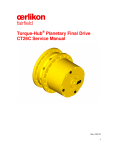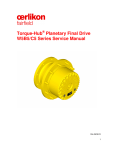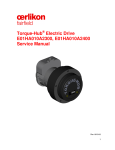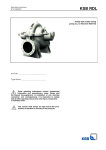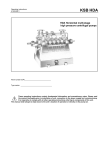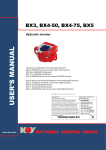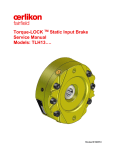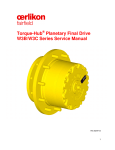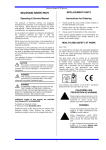Download Service Manual
Transcript
Torque-Hub® Integrated Drive CT07M2 Assembly-Disassembly Manual 07/02/2010 REV 1 While every precaution has been taken in the preparation of this document, Fairfield Manufacturing assumes no liability with respect to the use of the documentation described herein, or for any act or omission of Fairfield concerning this documentation. Features and specifications are subject to change without notice. 2 Table of Contents Introduction ................................................................................................................................. 4 Roll and Leak Testing ................................................................................................................. 5 Lubrication Information ............................................................................................................... 6 Main Disassembly....................................................................................................................... 7 Main Assembly ........................................................................................................................... 9 Assembly Drawing……………………………………………………………………………………….11 Parts List..................................................................... ……………………………………………..12 Tool Prints………………………………………………………………………………………………...13 Contact Information .................................................................................................................. 14 Fairfield Manufacturing Company, Inc. P.O. Box 7940 U.S. 52 South Lafayette, Indiana 47903 Phone 765-772-4000 Fax 765-772-4001 MMX 3 Introduction This manual is a step-by-step guide to the disassembly and assembly of Torque-Hub® integrated drive, and is designed for the customer or shop mechanic who is repairing this particular model of TorqueHub®. Users of this manual should note that each part mentioned is followed by an identification number enclosed in parentheses. These part numbers may be referred to in the Parts List section of this manual and on the illustrated parts breakdown of this unit. Users should familiarize themselves with the procedures for roll and leak testing found on the following two pages before starting any repairs. Standard safety practices should be followed during the disassembly and assembly procedures described. Safety glasses and safety shoes should be worn, and heavy, heat resistant gloves should be used when handling heated components. Be especially alert when you see the word CAUTION. This indicates that a particular operation could cause personal injury if not performed properly or if certain safety procedures are not followed. The word NOTE is used to bring attention to the user of certain procedures or helpful hints that will aid in the disassembly and assembly steps. 4 Roll and Leak Testing Torque-Hub® drives should always be roll and leak tested before full disassembly and after reassembly to ensure that the unit’s gears, bearings, and seals are working properly. The following information briefly outlines what to look for when performing these tests. The Leak Test The purpose of a leak test is to make sure the unit is airtight. To perform the test, first remove one of the oil fill & check plugs from the housing of the gearbox. Replace the oil fill & check plug with an adaptor that has an SAE #6 o-ring plug male thread to a pipe nipple, tee, with a 15psi pressure gage, zero leaks shut off valve and an air line connector. Make sure none of the connections leak. With the shut off valve in the closed position, connect the air line supply to the air line connector. Crack open the shut off valve slowly until the pressure on the pressure gage reads 10 psi. Close the shut off valve. If there is no more than 1 psi pressure decay in 20 minutes then the unit is considered to be sealed. This standard is for a unit without oil fill. Leaks will most likely occur at the Pipe Plugs, the main seal, or wherever o-rings or gaskets are located. The exact location of a leak can usually be detected by brushing a soap and water solution around the main seal and where the o-rings or gaskets meet on the exterior of the unit and then checking for air bubbles. If a leak is detected in a seal, o-ring, or gasket the part must be replaced, and the unit rechecked. The Roll Test The purpose of the roll test is to determine if the unit’s Gears are rotating freely and properly. The Gears should rotate in the unit when a constant force is applied to the roll checking apparatus. If more drag is felt in the Gears only at certain points, then the Gears are not rolling freely and should be examined for improper installation or defects. Some Gear packages roll with more difficulty than others. Do not be concerned if the Gears in the unit seem to roll hard as long as they roll with consistency. THE ROLL TEST OF THIS UNIT IS TO BE PERFORMED AT THE TIME OF DISASSEMBLY. 5 Lubrication Information General Properties The lubricant used in all Torque-Hub® drives should be a petroleum based, non-detergent gear fluid containing anti-oxidation, anti-foaming and extreme pressure (EP) additives. The lubricant should have a minimum viscosity index of 90 cst and maintain a minimum viscosity of 40 cst under normal operating temperature conditions. Maintenance An initial oil change should be made after the first 100 hours of operation. Subsequent oil changes should be made at 1000 hour intervals or annually, whichever comes first. Oil temperature should be no higher than 160° to 180°F for continuous operation, and no higher than 225°F for intermittent operation. Oil Fill Level When the Torque-Hub® unit is mounted horizontally, the CT07M2 gearboxes should be filled with 27 oz. of 80W90 oil when unit is filled for the 1st time, or whenever unit has been completely disassembled and rebuilt. For normal oil changes, position fill level line on cover to the horizontal position and fill to line approximately 27 oz. of 80W90 oil, AGMA GL5 specification or ISO 220. For operation at extreme ambient conditions above 100°F synthetic oil is recommended for proper lubrication life at an elevated temperature. 6 Disassembly Procedure CT07M2 Main Disassembly 1. Perform Leak Test prior to disassembling the unit. 2. Remove Oil Plug (1C), Drain oil from unit. NOTE: Note the condition and volume of oil before draining. 3. Remove Retaining Ring (6B) by prying the open end of the retaining ring out of the groove in the Housing (1G) with a screwdriver, then grasp the loose end with pliers and pull the retaining ring completely out of the groove. 4. Remove Cover (6A), remove O-ring (17) from groove in the Cover (6A) and discard o-ring. Note: The unit can be carefully pressurized with air to remove the cover from the unit. 5. Remove Spacer (2) from Cover (6A). 7 6. PERFORM A ROLL TEST : Remove the Input Shaft (9) and use tool T- 218221 so that the gear portion is in mesh with the input planet gears (3F). Rotate the Gearbox both clockwise and counterclockwise the same number of turns as the ratio of the unit. The nominal Gearbox ratio for this unit is 22 to 1. 7. Lift out Input Carrier Subassembly (3). 8. Remove Thrust Washer (11) from counter bore in Output Carrier Subassembly (4). 9. Lift Output Carrier Subassembly (4) from Housing (1G). 10. Remove Lock Nut (1L) with Lock Nut Wrench (T-215480). 11. Remove Housing (1G) from Motor Spindle Subassembly (1A). 12. Remove Face Seal (18) from Housing (1G). 13. Remove Face Seal (18) from Motor Spindle Subassembly. This concludes the Main Disassembly. 8 Assembly Procedure CT07M2 Main Assembly 1. Place Motor Spindle Subassembly (1A) on bench with spline end facing up. 2. Using a clean rag and alcohol, clean face seal bore on Motor Spindle Subassembly (1A) and the rubber ring of the Face Seal (1B). Press the Face Seal (1B) into the seal counter bore of the Motor Spindle Subassembly (1A) by hand until it is seated. 3. Using a clean tissue remove any debris from the metal surface of the Face Seal (1B). Using a clean foam brush, apply a light coat of 80W90 oil to the metal surface of the Face Seal (1B). 4. Using a clean rag and alcohol, clean face seal bore on Housing (1G) and the rubber ring of the Face Seal (1B). Press the Face Seal (1B) into the Housing (1G) seal counter bore by hand until it is seated. 5. Using a clean tissue remove any debris from the metal surface of the Face Seal (1B). Using a clean foam brush, apply a light coat of 80W90 oil to the metal surface of the Face Seal (1B). 6. Install the Housing (1G) onto the Motor Spindle Subassembly (1A). 9 7. Install Bearing Nut (1E) with face groove facing out. Torque Bearing Nut (1E) to 150 ft-lbs. 8. Rotate Housing (1G) to seat the bearing, and then torque the Bearing Nut (1E) to 150 ft-lbs. If the Bearing Nut moves, then rotate the housing again and re-torque the nut to 150 ft-lbs. Repeat this process until there is no additional movement of the Bearing Nut. 9. Spray inside of the Housing (1G) with a light coat of Rustilo-4140 oil. Being careful not to get any Rustilo-4140 into the small opening in the Motor Spindle Subassembly (1A). Install Output Carrier Subassembly (4), by aligning the 2 lugs on the carrier with 2 slots in the Bearing Nut (1E). Check several orientations of the carrier to fit the slots in the bearing nut. If the Bearing Nut (1E) needs to be moved to locate the carrier lugs ALWAYS tighten the nut. 10. Using Grease install Thrust Washer (11) onto Output Carrier (4). 11. Spray inside of the unit with a light coat of Rustilo-4140 oil and install Input Carrier Subassembly (3). Being careful not to get any Rustilo-4140 into the small opening in the Motor Spindle Subassembly (1A). 12. Place tool T-218221 into mesh with Input Carrier Subassembly planet gears. Roll unit both directions to check if gears move freely. Remove tool. 13. Lubricate seal diameter of Input Shaft (9) with hydraulic oil. Install Input Shaft (9) using caution to not cause damage to seal in the Motor/Spindle Subassembly (1A). 14. Apply grease to Spacer (2) and install it into the Cover (6A). Apply grease to O-Ring (17) and install into the groove in the Cover (6A). 15. Install Retaining Ring (6B) into groove in the Housing (1G) to retain the Cover (6A). Be sure the Retaining Ring (6B) is seated. 16. Install all Oil Plugs (1C) and pressure check the unit. This concludes the Main Assembly. 10 11 Assembly Drawing 12 Parts List CT07M2 ITEM # 3 4 1G 9 1F 6A 11 1D 15 1B 6B 16 17 2 1E 1A QTY 1 1 1 1 1 1 1 2 1 1 1 2 1 1 1 1 DESCRIPTION Input Carrier Subassembly Output Carrier Subassembly Housing Input Shaft Ring Gear Cover Plate Thrust Washer Tapered Bearing Assembly I.D. Plate Face Seal Internal Retaining Ring Rivet O-Ring (-172,8.237,.103) Spacer Bearing Nut Motor/Spindle Subassembly 13 Tool Prints 14 With over 90 years of experience, Fairfield Manufacturing has become the largest U.S. non-captive producer of Gears, custom Gear assemblies, planetary final drives, and related Gear products. Fairfield Manufacturing, headquartered in Lafayette, Indiana, is distinguished by our extensive design, manufacturing, and applications engineering capabilities. Our 500,000 square foot plant is a modern, fully equipped manufacturing facility that includes a full service heat treat department. Our philosophy of synchronous engineering is a partnership that matches our best and brightest people with your people to evaluate your unique requirements, and develop products and assemblies that meet your needs. For more information, contact Fairfield today. Mailing Address: Fairfield Manufacturing Co., Inc. U.S. 52 South P.O. Box 7940 Lafayette IN 47903-7940 Shipping Address: 2309 Concord Rd. Lafayette, IN 47909 Telephone: Main Automated Voicemail (765) 772-4000 (765) 772-4002 (765) 772-4003 FAX: Main Applications Engineering Sales and Service (765) 772-4001 (765) 772-4011 (765) 772-4010 E-mail: Applications Engineering Sales [email protected] [email protected] Website: www.fairfieldmfg.com 15















